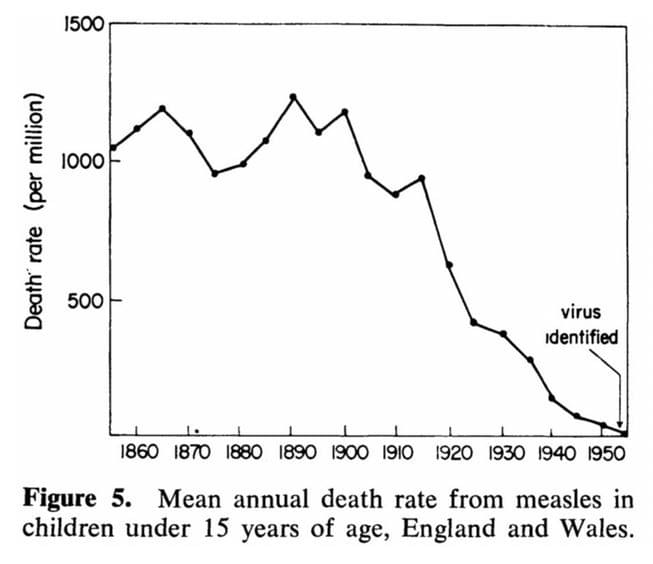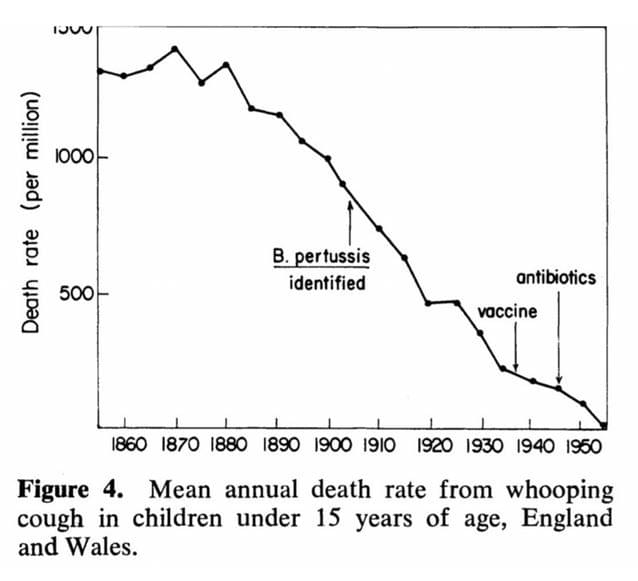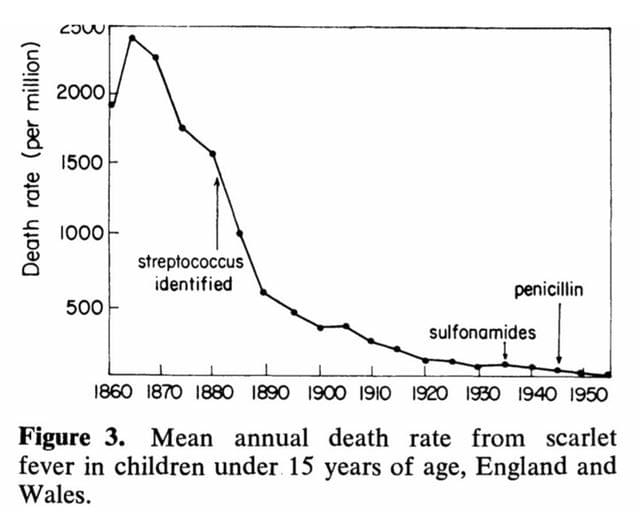Kennedy, Jr. On the Dramatic Decline in Mortality from Infectious/Non-infectious Illnesses during the 20th Century
By Tobin Owl
In a response to blogger Daniel Pinchbeck's articles (2/23/21 and 12/10/20) expressing doubts concerning Robert F. Kennedy, Jr.'s attributing the dramatic decline in mortality in the 20th century to societal improvements (rather than to vaccines or other medical interventions) Kennedy cited two seminal epidemiological studies (see below) and also cited a speech by Harvard Medical School Dr. Dean Edward H. Kass in 1970 to the annual meeting of the Infectious Diseases Society of America, of which Kass was both a founding member and first president. Kass was also a founding editor of the Journal of Infectious Diseases, where his speech, “Infectious Disease and Social Change,” would be preserved for posterity.
On Oct. 19, 1970, Kass told his colleagues that the dramatic decline in infectious disease mortalities during the 20th century “is merely the most important happening in the history of the health of man.” He cautioned that:
“This decline in rates of certain disorders, correlated roughly with socioeconomic circumstances … Yet we have only the vaguest and most general notions about how it happened and by what mechanisms socioeconomic improvement and decreased rates of certain diseases run in parallel … we had accepted some half truths and had stopped searching for the whole truths. The principal half truths were that medical research had stamped out the great killers of the past — tuberculosis, diphtheria, pneumonia, puerperal sepsis, etc. — and that medical research and our superior system of medical care were major factors extending life expectancy, thus providing the American people with the highest level of health available in the world. That these are half truths is known but is perhaps not as well known as it should be.”
During his speech, Kass had presented several graphs that bring highly into question to what degree, if any, medical interventions had played a role in the decline in mortality from disease in the 20th century.
(Charts below copied from Children's Health Defense, The Impact of Vaccines on Mortality Decline Since 1900—According to Published Science)

Why doesn't this chart show when the measles vaccine was produced? In 1970, when Kass gave his speech, the measles vaccine was just beginning to be rolled out. By that time measles was not considered a serious threat--nonetheless measles vaccine would from that time begin to be promoted as a necessary and life-saving intervention.

In this case, you can actually see when the Pertussis vaccine was introduced late in the game.

Kass also showed this chart for Scarlett Fever. A vaccine for Scarlett Fever has never been produced, yet the huge decline in mortality from Scarlett Fever looks very similar to measles and pertussis. Many other diseases, both those considered infectious and otherwise, showed a similar decline in mortality, as demonstrated by other graphs presented by Kennedy in his response to Pinchbeck.
According to the Children's Health Defense article:
Dr. Kass pled with his colleagues to be open to understanding WHY infectious diseases had declined so dramatically in the U.S. (as well as other first world countries). Was it nutrition? Sanitary methods? A reduction in home crowding?
CDC and Johns Hopkins researchers' epidemiological study, 2000
Apart from Kass' speech, in his response to Pinchbeck's doubts Kennedy cites an extensive epidemiological study published in Pediatrics in 2000 as well as an article by two Boston University epidemiologists (and husband and wife) John and Sonja McKinlay published in the Millbank Memorial Fund Quarterly in 1977.
The Pediatrics study authors (Guyer et al, December 2000) were researchers representing the Centers for Disease Control and Prevention and Johns Hopkins School of Public Health:
Author Information
- Bernard Guyer, MD, MPH
*,
- Mary Anne Freedman, MA
‡,
- Donna M. Strobino, PhD
*,
- Edward J. Sondik, PhD
- From the
*Department of Population and Family Health Sciences, Johns Hopkins School of Public Health, Baltimore, Maryland; and the
- ‡
National Center for Health Statistics, Centers for Disease Control and Prevention, Hyattsville, Maryland.
According to Kennedy:
After extensively studying a century of recorded data, researchers concluded: “Thus vaccinations does not account for the impressive declines in mortality from infectious diseases seen in the first half of the twentieth century.”
McKinlays' 1977 study--formerly required reading for medical students
Concerning the McKinlays' article, titled “The Questionable Contribution of Medical Measures to the Decline of Mortality in the United States in the Twentieth Century,” Kennedy states:
In this article, which was formerly required reading in U.S. medical schools, the McKinlays pointed out that 92.3% of the mortality rate decline happened between 1900 and 1950, before most vaccines existed, and that all medical measures, including antibiotics and surgeries, “appear to have contributed little to the overall decline in mortality in the United States since about 1900 — having in many instances been introduced several decades after a marked decline had already set in and having no detectable influence in most instances.”
The McKinlays’ study concludes that vaccines (and all other medical interventions, including antibiotics and surgeries) were responsible for — at most — somewhere between 1% and 3.5% of that decline. Put differently, at least 96.5% of the decline (and likely more than that) occurred for the reasons I cited in my discussion with you [Pinchbeck].
Finally, The McKinlays presciently warned that profiteers among the medical establishments would try to assign credit for the mortality declines to vaccines and other interventions in order to justify government mandates for their medical interventions.
Conclusion
I would like to add here that despite Daniel's apparent ignorance regarding the abscence of proof for attributing decline in mortality of the 20th century to vaccines (or medical interventions), I think both of his articles (Feb. 23, 2021 and Dec. 10, 2020) make an interesting read.
Pinchbeck had made his remarks in following an Instagram interview he had with Kennedy, which has since been removed (along with Kennedy's entire Instagram platform which had 793,000 followers), due to social media's growing encroachment on open debate and freedom of expression--as well as their inability (or complete lack of interest) in distinguishing "false news" from thoroughly researched information based on peer reviewed literature and government reports.
In Pinchbeck's Feb. 23 article, while commending Kennedy's stand against the tide of corruption on many fronts, Pinchbeck comments on the interview:
“(Kennedy) proposed, instead, that other societal improvements like better sanitation were responsible for the disappearance of childhood diseases at that time, not vaccines. I have not seen convincing evidence supporting this.”
It is to these comments that Kennedy responds:
Daniel, despite the popularity of your assumption, I have not been able to find a published peer-reviewed study that suggests it has any basis beyond pharmaceutical industry propaganda, about which both Kass and the McKinlays so eloquently warned.
Giving credit to vaccination for the precipitous decline of disease mortalities therefore invokes Rene Dubos’s observation that:
“When the tide is receding from the beach it is easy to have the illusion that one can empty the ocean by removing the water with a pail.”
For more details regarding common life-threatening diseases of the early 20th century and beyond, see my previous articles: